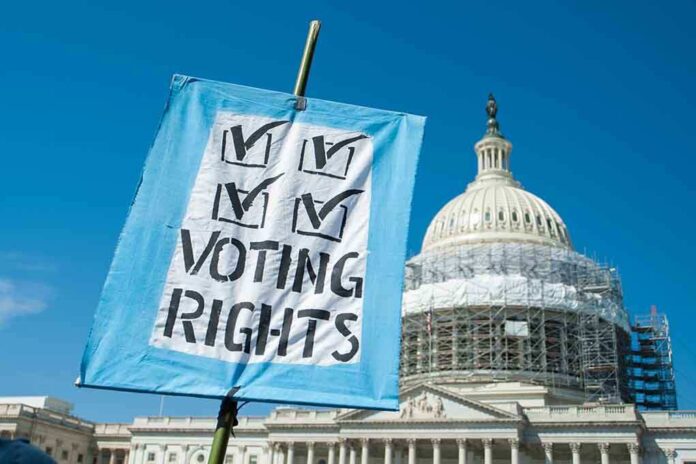
House Republicans successfully blocked non-citizens from casting votes in Washington D.C. local elections, with 56 Democrats crossing party lines to support the measure in a decisive 266-148 vote.
Key Takeaways
- The House voted 266-148 to nullify D.C.’s 2022 Local Resident Voting Rights Amendment Act, which allowed non-citizens to vote in local elections after just 30 days of residency.
- 56 Democrats joined Republicans in supporting the bill, introduced by Rep. August Pfluger, signaling bipartisan concern about non-citizen voting.
- Republicans argued that allowing non-citizens to vote dilutes citizen voting power and creates risks of foreign influence in American elections.
- The bill’s passage represents the first significant congressional intervention in D.C. governance in decades, reviving debates about federal authority versus local autonomy.
- Under the 1973 D.C. Home Rule Act, Congress retains authority to overturn local D.C. laws, a power rarely exercised until recent Republican initiatives.
Republicans Act to Protect Citizen Voting Rights
In a strong show of legislative authority, the Republican-controlled House passed a bill to block non-citizens from voting in Washington D.C. elections, overturning a 2022 local law that permitted such voting after just 30 days of residency. The measure passed with a vote of 266-148, with one member voting present and 56 Democrats crossing party lines to support the legislation. The bill, introduced by Rep. August Pfluger (R-TX), represents a significant assertion of congressional authority over the nation’s capital and highlights the ongoing tension between federal oversight and local governance in the District.
“Free and fair elections are a prerequisite for a healthy republic. The radical DC Council’s decision to allow noncitizens—including illegal aliens and foreign agents—to vote in local elections dilutes the voting power of the citizen voter,” said Rep. August Pfluger (R-TX).
The legislation specifically targets D.C.’s Local Resident Voting Rights Amendment Act, which expanded voting rights to non-citizens in local elections. Proponents of the congressional intervention argue that voting is a fundamental right of citizenship that should not be extended to foreign nationals, while critics view it as federal overreach into local affairs. This action marks the first major congressional intervention in D.C. governance in decades, with Congress having largely refrained from exercising its authority over D.C. laws for over 30 years until 2023.
National Security and Citizenship Concerns
Republican lawmakers emphasized that allowing non-citizens to vote poses potential national security risks and undermines the value of American citizenship. The law’s provision allowing voting rights after just 30 days of residency in D.C. raised particular concerns about foreign influence. Rep. Pfluger and others specifically pointed to the possibility that foreign embassy personnel and other non-citizen residents could potentially influence local governance in the nation’s capital, creating what they view as unacceptable security vulnerabilities.
“The right to vote is a defining privilege of American citizenship. Diluting that right by extending it to non-citizens — whether here legally or illegally — undermines the voice of D.C. residents,” said Rep. James Comer (R-KY).
House Majority Leader Steve Scalise emphasized the Republican position that voting should be reserved exclusively for American citizens, stating, “If D.C. wants illegals to vote, we’ve made it clear at the federal level people here illegally should not vote in any elections.” This stance aligns with broader Republican efforts to strengthen election integrity nationwide. The significant number of Democrats who supported the measure suggests that concerns about non-citizen voting extend beyond partisan lines, with many legislators viewing voting as an essential right that should remain connected to citizenship.
Constitutional Authority and Home Rule Tensions
The congressional action has reignited debate about D.C.’s unique status and the extent of federal authority over local governance. Under the D.C. Home Rule Act of 1973, Congress retains ultimate authority over the District’s laws and can overturn local legislation. While D.C. officials and many Democrats argue for greater local autonomy and even statehood for the District, Republicans maintain that congressional oversight is both constitutional and necessary, particularly when local decisions potentially impact national interests or constitutional principles.
“D.C.’s City Council made radical decisions in our nation’s capital under the Biden-Harris administration, passing local laws that are woefully inconsistent with national standards or constitutional principles,” said Rep. August Pfluger (R-TX).
While D.C. is not the only jurisdiction to permit non-citizen voting in local elections—several cities in California, Vermont, and Maryland have similar provisions—its status as the nation’s capital gives the issue particular significance. The successful passage of this legislation demonstrates President Trump’s strengthened position in Congress following the 2024 election, with Republicans now able to advance their policy priorities more effectively. The bill now moves to the Senate, where its prospects are significantly improved under Republican control compared to previous attempts that were blocked by Democratic opposition.












